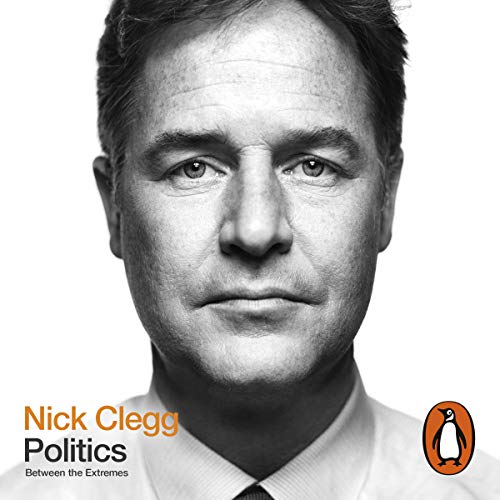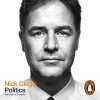Politics: Between the Extremes (Audio Download): Nick Clegg, Nick Clegg, Random House Audiobooks: Amazon.co.uk: Books
£2.80
Politics has changed. Five years ago Britain had a coalition government built on compromise. Now the Conservatives rule unchallenged, a chasm has opened up between Left and Right and the centre ground is deserted.
Nick Clegg knows the volatile state of modern politics better than anyone else. Here he offers a frank and honest account of his experiences – from his spectacular rise in the 2010 election through his tumultuous years as Deputy Prime Minister to a brutal defeat in 2015 – in order to tell the inside story of this change and reflect on what it means for our future.
He writes candidly about his own mistakes – including the controversy around tuition fees – the tense standoffs within government and the sometimes bizarre challenges he faced. He lifts the lid on the arcane world of Westminster, offering startling insights into the hidden workings of government, and reflects deeply on the decision to enter coalition with the Conservatives.
In a rapidly and profoundly changing world, he argues that the long-term survival of progressive politics relies more than ever on the radical reform of our outdated political system. Whatever your political persuasion, if you wish to understand how Britain is run today you cannot afford to ignore this audiobook.
Read more



by mastercj
This is a very good book, very well written, and the Audio version is read by Nick Clegg himself which makes it flow much more easily than the equivalent Gordon Brown account of the previous Labour government’s time in office, that is only read by a narrator.
Nick Clegg does his very best to exonerate himself and his party from some of the blame for the Coalition’s setbacks and failures and tries to correct the very lazy and often prejudiced assumptions and opinions of large numbers of voters, among them many Liberal Democrats, who were both disappointed and disillusioned with what they saw as a bit of a sell out coalition that seemed to allow the Tories to not only claim the credit for the all the Coalition’s successes but use that credit as a sort of fuel to springboard their successful efforts to subsequently gain an overall majority in the 2015 General Election. The abandonment of the University tuition fees policy being, he acknowledges, the touchstone example of how this voter dissatisfaction subsequently undid the Lib Dems bid to continue to grow as a political force at the ballot box – Clegg loosing his own seat at that election of course. However, he does go to great lengths to explain where he and his party succeeded in putting the brakes on the greatest Tory excesses and in so doing gives a remarkably frank and clear set of insights into the workings of the Westminster system and how it consistently operates in favour of the bigger parties and against continental coalition and consensus style politics. Needless to say that ushers in the whole Brexit issue for analysis and debate and some very enlightening and interesting ideas about shaping the future towards his own Liberal vision. Allongside this account of struggling to maintain his values against the Tory leviathan he takes a sideswipe at Cameron and his party for their narrow interest policies and internecine struggles, while Labour fare no better in his opinion and the other minority parties, particularly the Welsh nationalists barely get a mention. He also caricatures George Osborne quite amusingly whilst paying tribute to David Laws, his own right hand man and Paddy Ashdown and Ming Campbell for helping him to hold on to the roller coaster and continue to play the Lib Dem leader and Deputy PM role successfully while the press tried to shred his good name. At the end of it all however, whilst he presents a vision worthy of Bentham and Stuart Mill and the great Liberal reformist tradition, we have to remember that we are heading into the 21st century not back to the 19th and something drastic needs to be done to change the trajectory of poorly managed decline that our nation finds itself on, and I am not at all sure that this book holds the answers!
by Mach3nomore
Can’t recommend this book enough, not least because of the moment we’re in right now in a world that seems to be being sucked away from rational, logical debate into the rabbit holes of emotional identity politics and the white heat of the political extremes.
Nick fairly paints a picture of both a moment in time when the country needed grown-ups in government but also the outdated workings of Westminster, Brussels and the exercise in self-harm that is tribalism.
Can’t quite agree with him on the EU as I think despite some of the Brexiteer idiocy out there, there was/is a good case for leaving as he rightly points out (remote, unaccountable junior buearocrats having lots of power, a ‘Marshall Plan’ requirement for Southern Europe are two he highlights himself), but Liberals in particular should be leading the charge for us to play the ‘long game’ with Europe and for us to re-join a reformed organisation.
You do get the image of a pretty decent man and party trying to apply common sense and fair play to political structures that are just too far lost in their own interests. Hopefully history should be way kinder to Nick Clegg than ‘the bloke who lied about university fees’ which is unfortunately how many will forever see him.
My worry is as the media in particular become more hypercritical of politicians in general, the good folks like Clegg will probably steer clear of politics in the future which will be terrible for us all.
by David Poyser
Most politicians simply cannot write. They think if they can get selected and elected as an MP, and rise to be Ministers, then they can also write. Many of them simply can’t. Clegg Can. He is intelligent enough to be ‘in’ the Establishment in every possible way, and yet not feel he is ‘of’ the establishment. Reading this book is like a really good session with the Sunday papers. He is open-minded and very well-read, so there are a zillion ‘well-worth-reading’ observations about the ways we could improve the way we do things in the UK. He is experienced, fresh from the highest office, yet young enough and certainly intelligently analytical, so he deserves to be listened to.
The book has an excellent index, and like most political biographies it will probably be more read from the index than as a whole, which is a pity. I enjoyed going from beginning to end, you can always skim read where you are not interested, as he has a lot of wisdom on a variety of diverse subjects including banks, ambitious high-flying young civil servants getting too much power (he was himself a once a high-flying young eurocrat), the ‘damned if you do damned if you don’t’ attitude of the media to the political class, and the of pensions policy our nation needs. These are probably not all areas where many readers would expect to find Clegg ‘bons mots’ and insights.
Confessing my own ‘special interest’ (the EU, and UK-EU relations in particular), Nick Clegg probably is in the UK’s Top Ten in his understanding of the EU. (I ought to confess here that I very much enjoyed working with him on a successful BBC programme I produced with the then Nick Clegg MEP as the programme’s ‘star’, in the 90s). He sees Brexit (as do many of us!) as “one of the greatest acts of national self-immolation in modern times” (frankly, I am personally not sure about the ‘one of’). Everything he says on Brexit should be food for thought for people who perhaps had not thought much about it until June 24th this year. This is very much a 2016 book, the Brexit situation alone is changing daily, so the book as a whole is worth reading now or never.
As a former Leader of a political party, he is somewhat duty-bound to sing the praises of his party given the time so many volunteers (who will be readers of this book) have given up for him – and let’s face it, some of the LibDem activists can be such great fun (even if their message is…….). I suspect most non-LibDem readers do not believe LibDems are both ‘radical’ and the ‘common sense’ centre at the same time, nor do we see LibDems as simultaneously both guardians of civil liberties and defence against terrorism. Many readers may well want to skim read some of the LibDem ‘plugging’ but as he says, he is one of the least tribal politicians and has friends in all parties, so the book is certainly far more than a party political rant on behalf of the LibDems (even if this is inevitably part of it). He is more than happy to own up to mistakes, rather than simply write a justification of his time in government.
The gossip level on the internal workings of his five years in government is pretty low, if that is your reason for reading political biography. On the other hand, the weekly quad meetings with Cameron, Clegg and their deputies are described, as is the philosophical basis for coalition government. This is certainly an excellent textbook for anyone entering into coalition government in the future.
If you intensely dislike a UKIP relative, get them this book for xmas. The ensuing heart attack is pretty much guaranteed